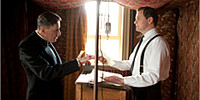 The sheer hugeness of the job
The sheer hugeness of the jobColin Firth, Helena Bonham Carter, Geoffrey Rush and Tom Hooper on The King’s Speech... • Page 2 of 2
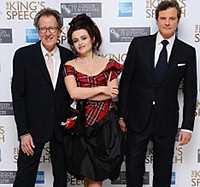
Running the gauntlet: Rush, Bonham Carter and Firth at the London premiere; and (below) at the film festival press conference.

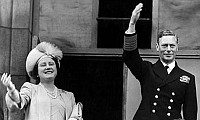
6.Jul.51 • Toowoomba, Queensland






TOM HOOPER
1972 • London




 When you play a character like this, do you do a lot of research, or do you try her on at home?
When you play a character like this, do you do a lot of research, or do you try her on at home? Helena: Yeah, otherwise it wouldn't be any fun. Certainly, like in this case, when you're playing a real person you've got a real responsibility. So I did read the William Shawcross a bit, but that got a bit samey to be honest. Hugo Vickers wrote an unauthorised biography - I read that. But I didn't actually have that long; I had about two and a half weeks, and I think I was playing a witch in Harry Potter at the same time. In fact, I don't think I actually ever said yes to this job. I said no.
Geoffrey: Do you want to say yes now?
Helena: Yeah, I'll do it!
Colin: We got quite a lot of the Harry Potter witch, didn't we?
Helena: Actually, my son, who was 6 at the time, would say, "Mum, do you have to be the witch or the queen tomorrow?" It was a good question. As long as I didn't get that mixed up. I had the teeth for the witch - it was slightly different gear. Having said that, the witch is quite exhausting because she's all screamy and a bit of a hooligan. So it was quite nice to have the weekends off, kind of, as the queen, just being a bit more restrained. Anyway, you do all the reading but then ultimately you have to serve the story. So I took what was relevant and I watched a bit. I mean obviously I don't look like her - I hope. I don't mean that in a disrespectful way - I mean, I don't look like her in her latter years, you know? I mean - dig, dig, dig - I might as well just die now. No! And Colin doesn't really look like him. But you just try and capture some kind of essence. I think I just concentrated on - no, I should just shut up. You know what I mean.
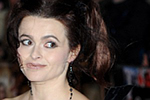
My son would say, “Mum, do you have to be the witch or the queen tomorrow?”
Helena: I did meet her. I met her because I think she came to the premiere of A Room With a View when I was very young, all those centuries ago. I got what I think most people perceived: she had this great grace and she was great at being gracious. She always had that sort of cloud of charming vagueness, but I think underneath it, having read about her, she had a huge amount of inner strength. Her great friend Cecil Beaton says that she was a marshmallow but made by a welding machine. And I wanted to try and get that duality.
Colin, what did you know about George VI?
Colin: I didn't know very much - almost nothing at all. My parents were children during his reign. I remember hearing my mother talking about his reluctance to take the throne and what a crisis that would have been for him personally. There was some expression of admiration for him and of that. And I remember her telling me about the stammer and expressing something about the relationship between Elizabeth and him, as she understood it, as being a close and loving one, and how young she was when she took the throne. Those are the vestiges of my childhood memory and that would be about it. I really knew nothing else at all.
Did you ever worry about what the Queen would make of this film, especially of the swearing scene?
Colin: And as for what the Queen will think when she sees it, I couldn't possibly comment on that.
Geoffrey: I have the image of Her Majesty on her laptop at Netflix, going, "What'll I put on the loop now?"
Colin: It's crossed my mind, but I don't know. I think it really works in our story. I would possibly doubt that it happened, but I think it's very unlikely we'll get anyone to verify it as inaccurate. And I just like it too much as a note, in terms of a breakthrough. It is quite a significant moment actually. He goes from almost a complete relapse, when he's confronting his brother, to this bizarre kind of catharsis, to a release of actual rage and full expression of panic, to the breakdown of this relationship. So you can't really get that arc without that piece. Had I had my script version of it, it would have been worse. There was a moment when producers just came running into the room saying, "No! You can say that and that, but not that. You cannot finish it with that word if you want a release in certain countries." It wasn't frivolous; we weren't cocking a snoop at anybody. We actually felt it had a genuine place as part of our story and part of the therapy.
Geoffrey: Did you say, "Poo, bum!" for the airline version?
Firth: We haven't got there yet, but I'm sure that will be delightful. I'm not convinced that one can have lived for a long time in the royal family without ever having heard those words. I mean, partly because they're surrounded by soldiers, although I'm sure they don't talk like that in front of the monarch. I don't think there's anybody alive who's ignorant of those words.
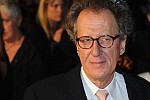
The house of Windsor was to me the first sort of reality TV show.
Geoffrey: I've always had an intriguing and fascinating obsession with the whole dynasty of British royalty back a millennia and a bit, because of the complexity of the history and the shaping of the various houses, and the sometimes bloody passing on of weird claimed lineage. And I suppose that the house of Windsor was to me the first sort of reality TV show, because they became a family. I remember the first time they let the cameras in to the palace, which must have been in the late 60s or early 70s, it was a sort of At Home With the Windsors, which was probably the beginning of the demystifying. I just found all of that intriguing. I'd like my country to be a little bit more adult and independent, but I do find the presence of royalty and monarchy in contemporary life still intriguing.
Helena: I think this film shows is a whole, completely new, fresh angle on a very famous period in history for us: the abdication. It came very close to a proper crisis in the monarchy. So the pressure on this man and the personal crisis - that was totally new to me. And I also think it's interesting that it's the story of the most reluctant king. He doesn't want to be king - it's the duty, the responsibility, the sheer hugeness of the job. I certainly would never want to be royal, even though I effortlessly am at times! That was partly why I did play it because I knew I could indulge in being queen. I could behave outrageously and it would be accepted - "She's getting into her part." But I've played a few queens lately and they are really enjoyable. I just do queens. So it's enjoyable to pretend, but then you can take the crown off and sling it off across the room. You don't have to be the nice smiling queen. She, the Queen Mother, was extraordinary because she was a professional public figure and expert at it. But she had the character and the confidence. I think she married a man who was not born to be king and wasn't really constitutionally meant to be king. Luckily he drew upon her confidence where he lacked it. And it was a really true partnership, a sort of symbiotic thing going on. She was the classic woman behind the man. Sadly, it wasn't called The Queen's Speech. It's The King's Speech, and it's the man behind the man. And then in the background, I'm just, you know, there.
LONDON FILM FESTIVAL, VUE WEST END • 21.OCT.10
HOME | REVIEWS | AWARDS | NEWS | FESTIVAL | Q&A | ABOUT | TALKBACK
